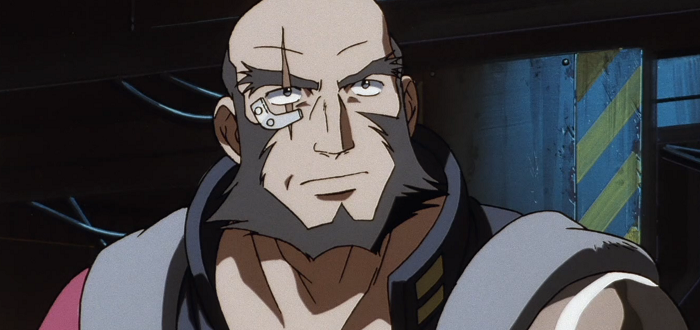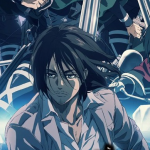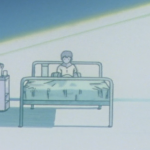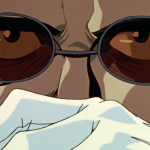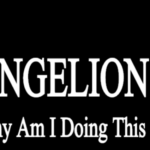Adios, Cowboy: Review 21 – Boogie Woogie Feng Shui
Allow me a moment to be honest with you, dearest reader, I am getting tired of this show. Like the March of a winter semester, I can see the light at the end of the tunnel. Yet that light remains largely eclipsed by a mountain of words demanding to be written. Similar to those student days, the task ahead of me would be easier if so much of the subject matter at hand didn’t feel so routine.
Such a sentiment might herald Critic Adam on the verge of another takeover. Rest assured he is safely locked-up for the time being. I don’t want sad attempts at comedy to undermine what I have to say in this review. Specifically, Boogie Woogie Feng Shui is, at best, an average episode of a Space Cops 20XX, a generic show about police who work in space. As an episode of Cowboy Bebop, a show that lives and dies by being cool and following a manifesto, it is a poor showing.
There’s no Kung-Fu Jazz in this episode; there isn’t even a measurable trace of Space Jazz, for that matter. All we have here is space magic acting as the driving force behind a tiresome and linear detective story. It begins when Jet receives a mysterious email from a dead man called Pao, one of Jet’s informants during his ISSP days and a syndicate consigliere. Investigating Pao’s death leads Jet to Meifa, Pao’s daughter, who believes that that Fung Shui can point the way to the truth of her father’s death.
It has been so long since Cowboy Bebop invoked mysticism as a narrative device that I forgot this sort of space magic was one of its power moves. We can now add geomancy to the augury, vision quests, and cardomancy that have driven Bebop plots. In truth, it would make sense that a version of Mars that is a cultural inheritor to contemporary China would have Feng Shui practitioners. Likewise, there’s no reason to reject the idea of a Martian crime syndicate using a Feng Shui master as an elder statesman to their dealings. However, I still find myself balking at mysticism underwriting this episode because it renews my discussion on character agency in Cowboy Bebop.
Simply put, I am out of gas when it comes to Bebop moving the story around its characters. I want to see these characters earn their growth and narrative consequence. Instead, this episode has Jet and Meifa following a Lou-Pan of Universal Fung Shui through one of Mars’ crater cities on a quest for a sunstone. What’s a sunstone? Another plot cheat, like the Luo-Pan. It sends the Bebop to the exact place in hyperspace where Pao’s ship was presumed lost in hyperspace.
Is there a daring rescue to save Pao from inter-dimensional limbo? No. Meifa uses the reunion as a vehicle for throwing a final few hurtful words at her father. Her petulance is short-lived before the episode takes a maudlin turn toward forgiveness. The writing is predictable when the transmission between the Bebop and Pao’s ship breaks-up at the exact moment Meifa utters the “but” that heralds the absolution of Pao’s parental shortfalls. I know I’m supposed to feel something in that moment, but at this point it’s the same old Bebop.
A particular oddity within this emotional coda is the way in which it exists outside the much-ballyhooed Bebop manifesto. Everything that goes on in this episode is as procedural as an episode of Law and Order. There are no new styles or new dreams in the episode. By the end of this adventure, the camera cuts over recycled footage of the Bebop crew going about their banal tasks. The final nail in the coffin is Jet narrating that everything has gone back to normal.
Does anybody else find that boring?
Did the ennui of modern life weigh so heavily in the 90s that merely mentioning the routine grind was enough to make a story resonate with the audience?
Perhaps the weak ending wouldn’t bother someone who found Boogie Woogie Feng Shui to be a heartfelt treatise on the reality of failed parent-child reconciliations. On those grounds, one could argue this episode is doing all it needs to do. It shows the audience a parent who is trying to protect their child from the realities of life. We can see Meifa moving on path from bitterness to acceptance of her father, and the transition is punctuated through the catharsis of Meifa’s final words. Did Pao see that she was about to forgive him before the signal broke up? We will never know. To that end, the episode leaves us with a lesson despite Jet’s tedious narration: don’t leave things unsaid with loved ones.
Of course, I wouldn’t be doing my job if I didn’t point out we saw a better approach to this kind of emotional story way back during Waltz for Venus. Even though Spike was the point of view character for that episode, Roco was the clear protagonist who had to work his way through a conflict – stealing from the mob – to achieve the goal of fixing his sister’s eyes. The audience had the time to empathize and connect with Roco’s struggle because everything Spike did was in service to Roco’s story. There’s no such synergy between Jet and Meifa. Instead, the audience is treated to the awkward voyeurism of the Bebop crew attempting to determine if Meifa is Jet’s love child or his barely-legal girlfriend. Allow me to offer a slow golf clap.
Boogie Woogie Feng Shui gives the audience space magic and hard-boiled narration. It takes a step back from the measured structure of past episodes, be they innovative or traditional, and instead doubles down on hoping that an emotional thrust to themes of parental alienation will help the episode stick the landing. All I can say on that front is that your mileage will vary.

